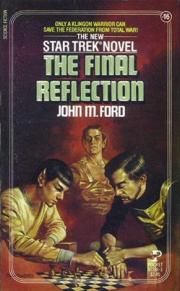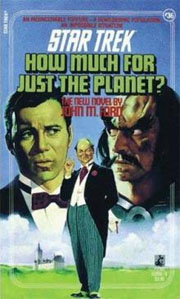As a television show, the original series of Star Trek focused on stories about Kirk and humanity. Some of the best Star Trek novels take advantage of this well-understood background to turn the readers’ attention to characters and races that were less thoroughly explored onscreen. John M. Ford’s World’s Apart series offers two excellent and very different examples of this. The Final Reflection and How Much for Just the Planet? were originally published in 1984 and 1987 respectively. The books were not linked at initial publication, but were hitched together when they were reprinted in 1999. The Final Frontier, which was ably reviewed by Jo Walton on this site in late January, represented an early effort to explore the Klingon Empire. How Much for Just the Planet? extends Ford’s exploration of Klingon culture by combining it with musical comedy.
The first time the Romulans appeared on Star Trek, the show could only afford a couple sets of ears and the rest of the Romulans had to wear big helmets. Since Klingon alien-ness in the original series was limited to being swarthy and willing to shoot people for no reason, Klingons were relatively inexpensive, which is almost certainly one of the reasons for the relatively frequent appearances of the Klingon race as villains of the week. As the alien race of convenience, the Klingons suffered from inconsistent characterization. In some episodes they relied on brute force and seemed to have a totalitarian political system with a high degree of personal risk and accountability. In other episodes, Klingon commanders seemed to operate independently and employed subtle, long-term strategies. The only important consistency was that, as the enemies of the Federation, the Klingons were metaphorically Soviet. Ford embraced the opportunities these inconsistencies offered for world-building, creating, in The Final Reflection, a Klingon approximation of The Hunt for Red October, which was published in the same year. The stories are not substantively similar, but the idea of seeing your enemy’s essential humanity and the uncertainty and danger inherent in international/intergalactic tensions bind them together thematically.
 If The Final Reflection is The Hunt for Red October, How Much for Just the Planet? Is The Mouse that Roared. Again, the stories are not substantively similar, but the humorous tone and the theme of exploiting intergalactic tension for the benefit of an otherwise vulnerable state bind the two together. In How Much for Just the Planet? a Federation Survey vessel and a Klingon ship discover Direidi, a planet in the Klingon-Federation neutral zone with OODLES of dilithium, basically simultaneously. Under the provisions of the Organian Treaty between the UFP and the Klingon Empire, this means that the two governments get to compete for the planet by demonstrating “the ability to develop the world in a peaceful and useful manner” with development rights being granted to “the party that best shows said ability.” The treaty does not make clear what role the indigenous population of the planet in question is supposed to play in this selection process, especially if, as in this case, they aren’t really keen on having their planet be useful to either party. Direidi’s answer to this problem makes extensive use of community theater.
If The Final Reflection is The Hunt for Red October, How Much for Just the Planet? Is The Mouse that Roared. Again, the stories are not substantively similar, but the humorous tone and the theme of exploiting intergalactic tension for the benefit of an otherwise vulnerable state bind the two together. In How Much for Just the Planet? a Federation Survey vessel and a Klingon ship discover Direidi, a planet in the Klingon-Federation neutral zone with OODLES of dilithium, basically simultaneously. Under the provisions of the Organian Treaty between the UFP and the Klingon Empire, this means that the two governments get to compete for the planet by demonstrating “the ability to develop the world in a peaceful and useful manner” with development rights being granted to “the party that best shows said ability.” The treaty does not make clear what role the indigenous population of the planet in question is supposed to play in this selection process, especially if, as in this case, they aren’t really keen on having their planet be useful to either party. Direidi’s answer to this problem makes extensive use of community theater.
It would be easy to summarize the remainder of the book as Glee in space. The production numbers are apparently spontaneous and lavishly produced. But this comparison ignores the intricately crafted story that runs both through and beneath a surface layer of escalating chaos. Behind the scenes, a group of writers and production staff are working frantically to make sure that all the characters play their parts and the resolution is believable. These characters are thinly veiled allusions to popular science fiction writers both an in-joke for devoted readers and a sly reminder that however outrageous this particular story seems, it works the way Star Trek has always worked.
The Final Reflection looked at the Klingon Empire through the eyes of extraordinary Klingons, who did extraordinary things. How Much for Just the Planet? looks at what it means to be Klingon through the eyes of Klingons in ordinary moments. Aperoki, the nerdy Klingon communications officer likes old Federation movies a little too much. Arizhel, the Klingon survey officer, talks about disappointing her parents with her career choices. A brief and hopeless romance between Arizhel and Captain Kaden vestai-Operai, is one of the best examples of the revealing nature of the mundane. In a rare, quiet moment they consider what their life together might be like, and realize that their empire’s current policies leave them with no plausible shared future.
Ford’s ideas about Klingons also had a limited future—they have been largely neglected in the accepted Klingon literature. Their omission from the canon is tragic and undeserved. The World’s Apart series is a much needed revelation of the potential of enhancing intergalactic understanding through a combination of traditional narratives and dinner theater.
Ellen Cheeseman-Meyer has been a Star Trek fan since the early 90s, but only started watching the series in 2009. She teaches history and reads a lot.











I’ve gotten away from Star Trek and Star Trek novels and never read _How Much For Just The Planet_.
However, IMO _The Final Reflection_ was a very good read.
While set in the Star Trek universe could have easily been set outside the Star Trek universe and been a great story about an alien empire.
And then there’s Spock’s female cousin, the klutzy Vulcan.
Even without understanding all the inside jokes, How Much For Just the Planet is one of the funniest novels I have ever read.
Oh, lord, the piano. Just imagining the piano makes me laugh. I’ve tried a few times to read this book to my daughter and failed because I cannot do it without cracking up.
A good farce always has a precision clockwork understructure because so much of the humor is the “you had to be there” sort, heightened by repetition with variations. Escalating misunderstandings are a staple. So are people who for some reason must not meet, but keep almost meeting, with consequent flailings-about and improvisations to keep it from happening, until finally they do meet at the worst possible moment and under the most disgraceful-seeming circumstances. Getting all of that to happen in the right order, with all of the components arriving at exactly the right place and time for maximum effect, takes very tight organization and timing.
The person who first explained that to me was John M. Ford.
I am also an enormous fan of his villanelle, “I am the king now, and I want a sandwich.”
How Much for Just the Planet was one of my favorite books as a kid — thank you for reminding me that it exists. I half thought I’d dreamed it up, heh.
I have an extensive collection of these tie-in novels, and honestly,
How Much for Just the Planet STILL makes me laugh until it hurts more than 20 years later. I actually adapted the computers personality for a role-playing character in high school. It wasn’t just Klingons that got a comedic overhaul in this one.
*absently wipes at a non-exsistent spot on his shirt*
Was there a n’gaan spiced (not peppermint) milkshake involved?
Before this, I’d kind of thought of the Barbarian Queen as Bernadette Peters, but now I’m thinking Santana Lopez.
Kurt Hummel would be great as Hotel Direidi’s entertainment director – the guy who sets up the duel between Scotty and the Klingon engineer. I’m torn between Mike/Tina and Finn/Rachel as Pete and Didi. They’d give such totally different readings, but maybe we really need Tina as Pam.
Where does Puck go? He’s too good to leave out.
Lead nomad! Or, for another flavor, Puck and Quinn could be Pete and Didi. Or he could sing “Percentages of Trade,” which seems like an idea he could get into, if he thought about it for a while. Mercedes would make a good bandit queen.
I tried to read this book twice – I’ve always heard how good it was, and always wanted to like it – but it never did it for me. I think it’s because, absent familiar tunes, you couldn’t sing the “musical numbers” with the characters in the book (unless I am misremembering). How can you have a musical comedy, really, without the music?
Since nobody else has said it: it’s Worlds Apart, not “World’s Apart”. And in the first paragraph, The Final Reflection is mis-spelled “The Final Frontier” :-)
Mike Poteet: if you want to try “How Much for Just the Planet?” it would help to brush up on your Gilbert and Sullivan first. “The Mikado,” “HMS Pinafore” and/or “The Pirates of Penzance” are probably the best places to start.
I would also love to see “Glee” tackle G&S, too. (After the much-rumored Springsteen episode, of course. But then that’s me.)
Mike Poteet, the songs do have tunes! The nomad song is the theme from Rawhide, and all the others are based on real songs too (variably popular – Mike Ford had ecclectic taste). There’s a list somewhere. I’ll dig when I get a chance.
http://therinofandor.blogspot.com/p/how-much-for-just-planet-search-for.html
It’s a work in progress.